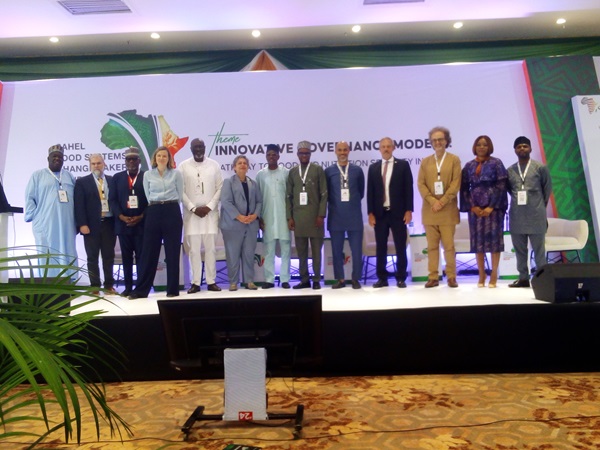Place your adverts here on InfoDig @ low rates; banner ads, sponsored links and guest articles etc. Contact us
 A cross section of participants at the SAHEL Food System Changemakers Conference 2024, held in Abuja.
A cross section of participants at the SAHEL Food System Changemakers Conference 2024, held in Abuja. The Minister of State for Agriculture and Food Security, Dr. Aliyu Abdullahi has reiterated the Federal Government’s commitment to addressing food and nutrition security in the country.
Abdullahi emphasised this at the SAHEL Food System Changemakers Conference 2024, held in Abuja, organised by SAHEL Consulting Agriculture and Nutrition Ltd, African Food Changemakers, Mercy Corps, Global Alliance for Improved Nutrition, German Cooperation GIZ, Feed Future, Heifer International, Casdoe, Centre for Journalism Innovation and Development (CJID), International Food Policy Research Institute (IFPRI) and Chemonics, with the theme: “Innovative Governance Models: A Pathway for Food and Nutrition Security in Nigeria.”
He stressed that the Ministry of Agriculture is committed to continuous farming, enabling farmers to take advantage of both the rainy and dry seasons to ensure sustained production.
Abdullahi revealed that for the 2023-2024 rainy season, the ministry is targeting 750 hectares of land for wheat, maize, rice and cassava cultivation through the National Agricultural Group Scheme and Agro Pocket Project.
“We are changing the narrative. After dry season farming, rainy season farming should begin seamlessly,” he said.
“To achieve this, we’ve developed improved crop varieties. Our research institutes focus on climate-smart technology, ensuring we have short-duration, drought-tolerant, and disease-resistant crops,” he added.
The minister highlighted that an annual performance survey of the wet season showed that an increasing number of farmers are relying on improved seeds.
“Our farmers now understand that with drought-tolerant and disease-resistant varieties, they can overcome many weather challenges. We’re also making changes to involve the youth in agriculture. President Bola Tinubu has approved mechanisation programmes that will bring in modern, computer-based tractors. The more mechanised, the more attractive agriculture becomes. We are also supporting women, especially in processing farm products.”
“There has been increased production in many of our commodities. 65 per cent of farmers are now using improved seeds, thanks to the availability of seeds from our research institutes,” he added.
Abdullahi underscored the ongoing activities designed to enhance the agricultural ecosystem.
He noted that food security faces challenges such as insecurity, climate change, floods, pests, diseases and global food crises.
“One of the challenges is that when there is abundant food, it drives prices down. But with scarcity, prices rise. The food inflation we’re seeing is driven by many factors. First, the massive 2022 floods destroyed farmlands. Then, during the 2023 elections, currency changes led farmers to sell off commodities at giveaway prices, leaving them without sufficient capital for the next planting season,” he stressed.
Speaking further, Abdullahi noted that the Russia-Ukraine war has negatively impacted the global food system and Nigeria, as a substantial importer, has had to bear the consequences.
According to Abdullahi, the government is making concerted efforts to tackle food insecurity and many farmers have returned to their farms.
In her keynote address, the mission director of the United States Agency for International Development (USAID), Melissa Jones stressed that achieving food and nutrition security in Nigeria requires innovative agricultural practices and reliance on individuals capable of driving this production.
She encouraged partners to foster strong connections between policymakers, civil society and academia to drive a sustainable transformation of Nigeria’s food system. With proper infrastructure, policies and support, Nigeria can meet its own food needs and emerge as a global food market player.
“We will jointly invest in technologies and infrastructure to promote food security and improve nutrition for future generations,” she said.
Similarly, the managing partner of SAHEL Consulting Agriculture and Nutrition Ltd, Temitope Adegoroye revealed that the number of food-insecure Nigerians rose from 66.2 million in Q1 2023 to 100 million in Q1 2024, with 18.6 million facing acute hunger and 43.7 million adopting crisis-level or worse coping strategies.
According to him, Nigeria’s food security crisis is a critical part of the nation’s broader social and economic instability, presenting a trilemma of food affordability, accessibility and availability.
“Nigeria faces 40 per cent wastage of its annual agricultural products, highlighting a significant opportunity for value addition and improved processing within the sector,” he said.
Adegoroye noted that SAHEL and African Food Changemakers are positioned to address the challenges facing Nigeria’s food system by engaging public and private sector players to implement high-impact interventions ranging from seed development to agribusiness support.
The German Ambassador to Nigeria, Annett Gunther called for collaboration among partners to create food security for the well-being of future generations.
She noted that Nigeria loses 800,000 metric tonnes of food annually and emphasised the need for partnerships to tackle the challenges of food security and climate change.
The country director of Mercy Corps Nigeria, Ndubuisi Anyanwu stressed that collaboration and innovation are at the heart of efforts required for food security in Nigeria.
“We should empower communities with the tools and resources they need to unlock opportunities for smallholder farmers and women,” he said.







)
)
)



